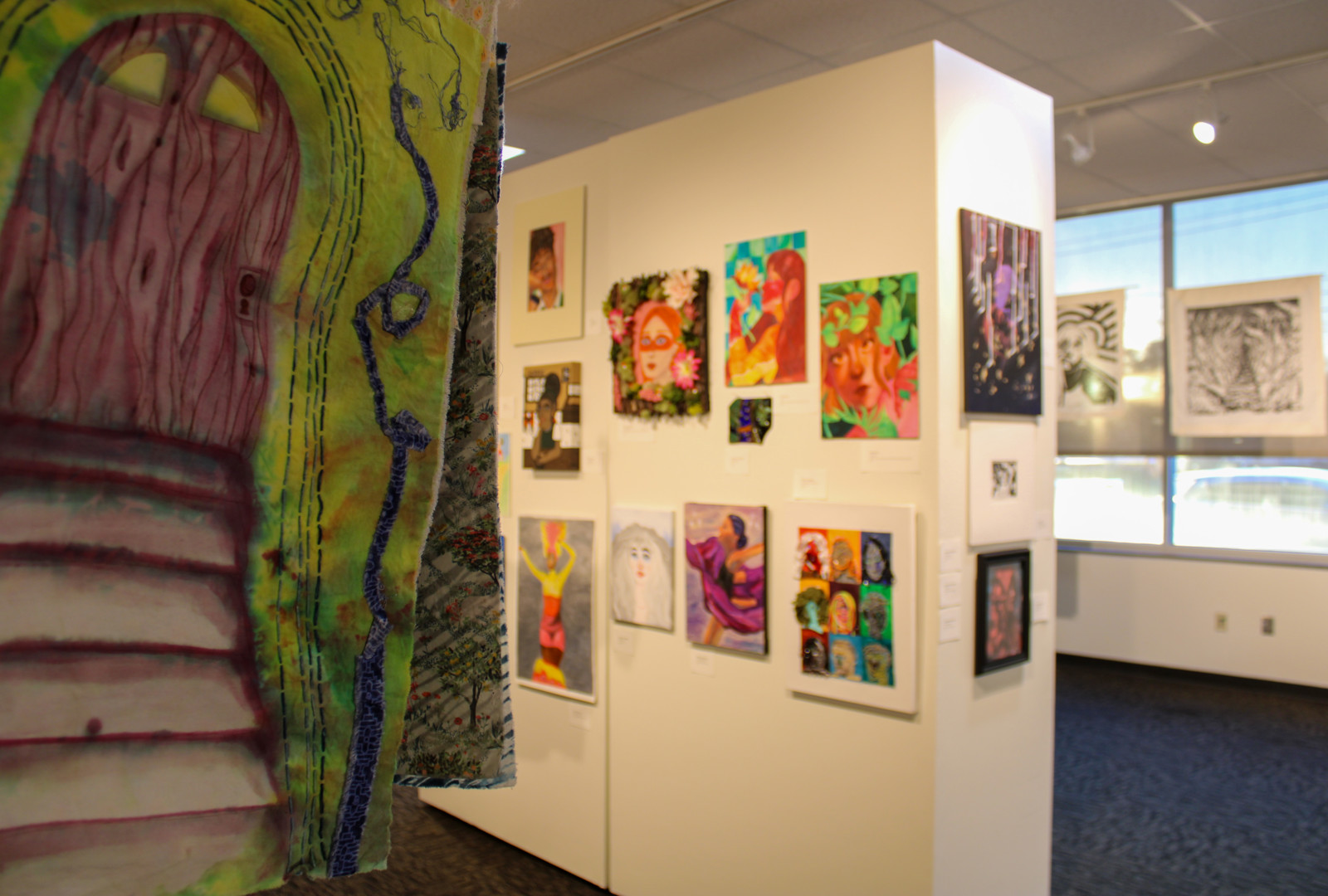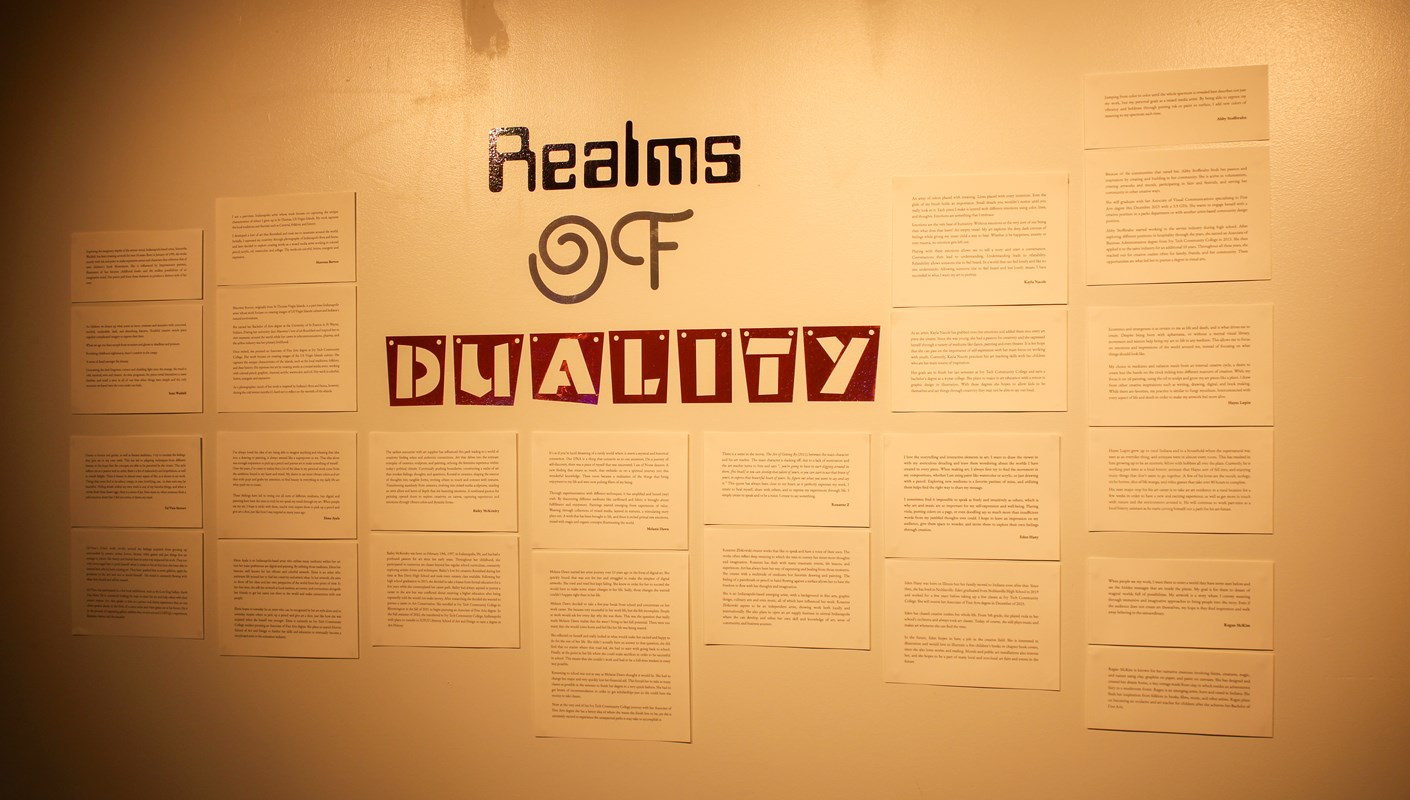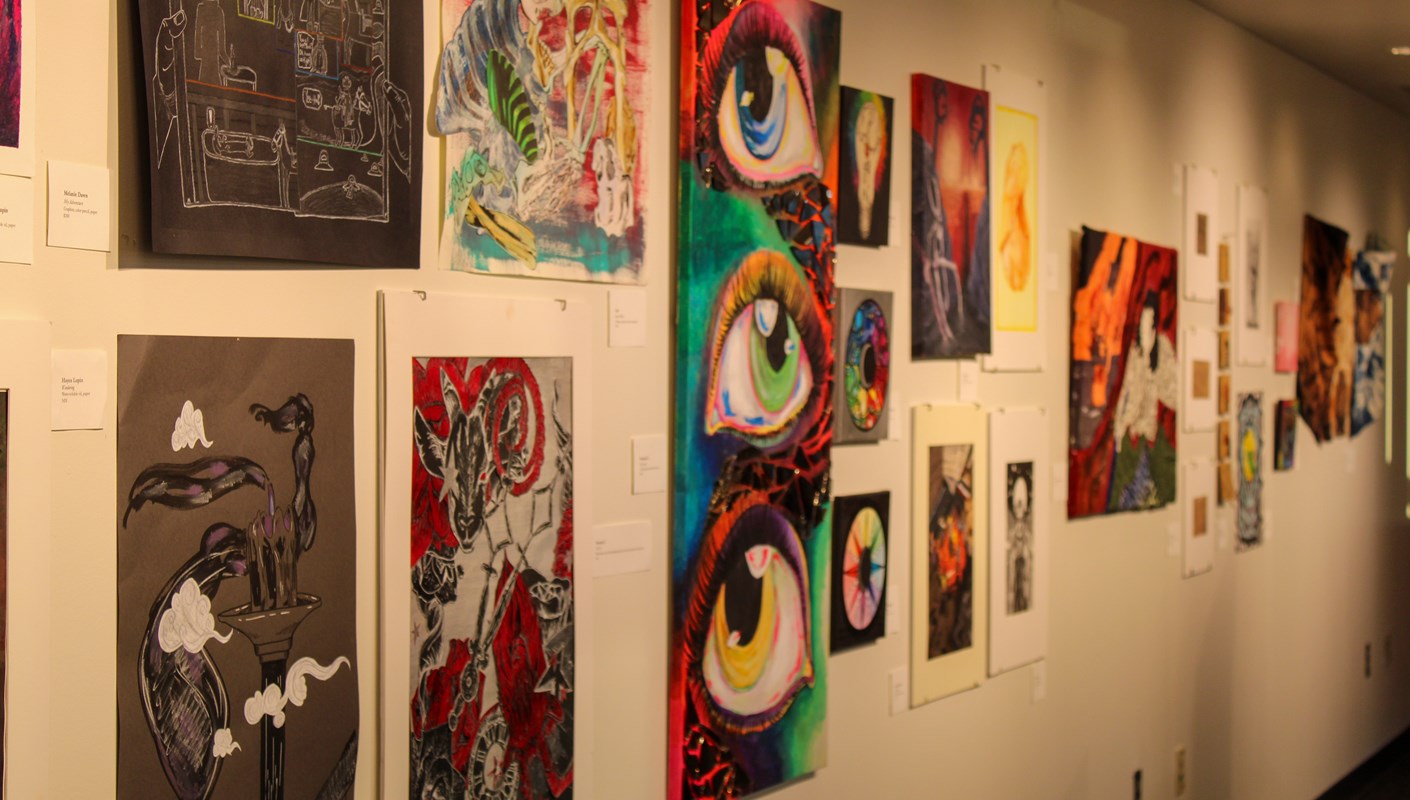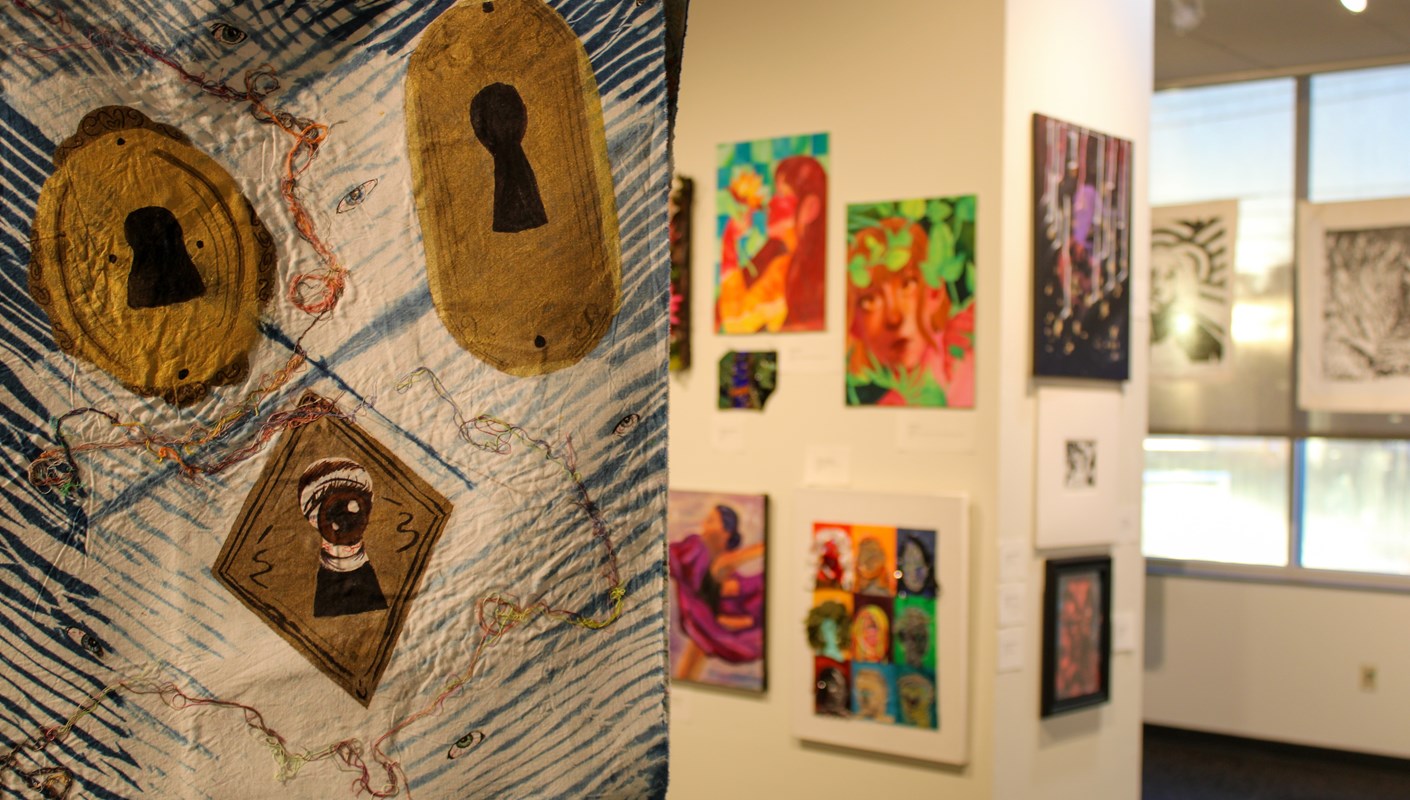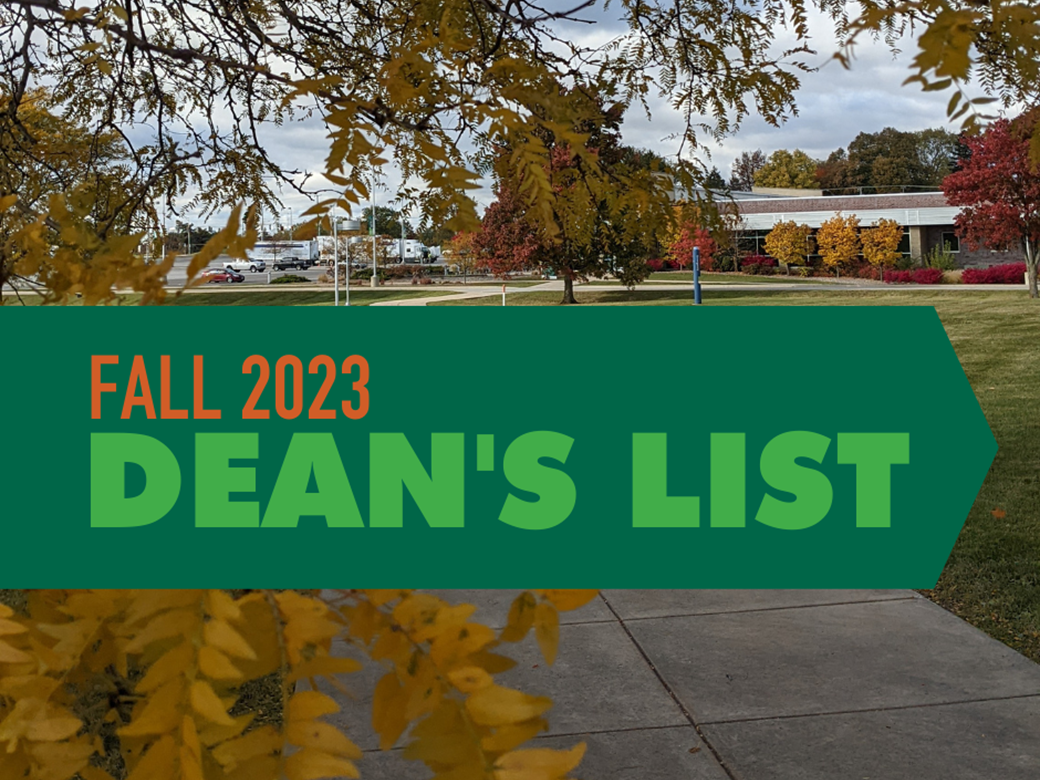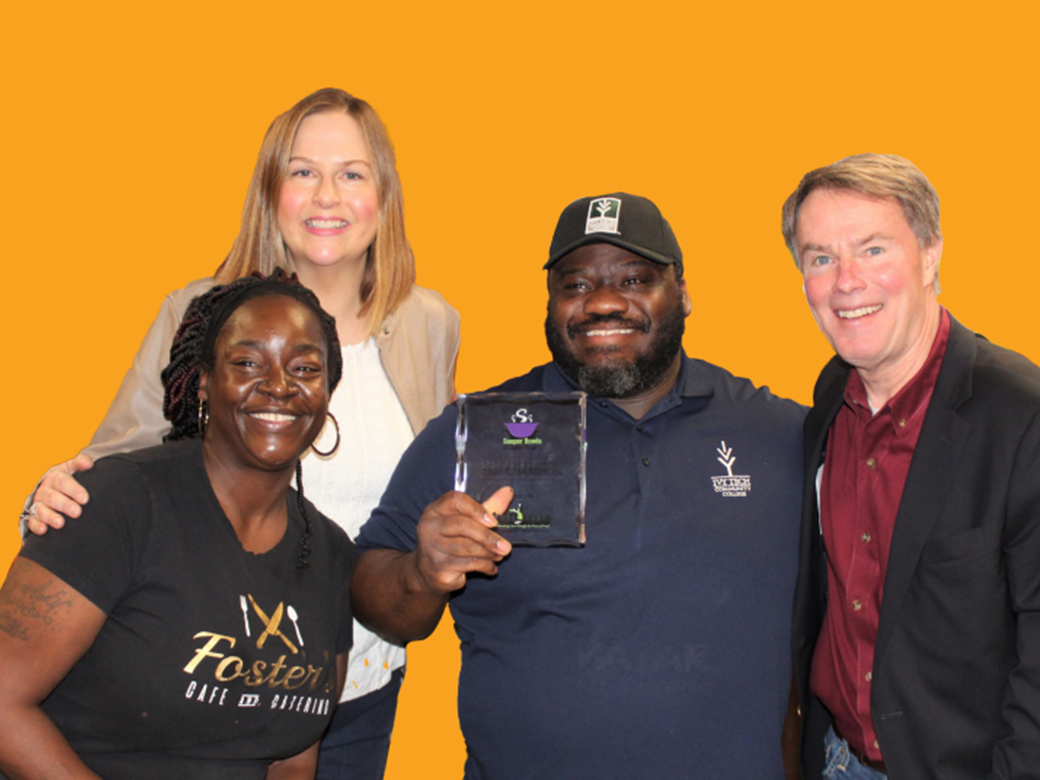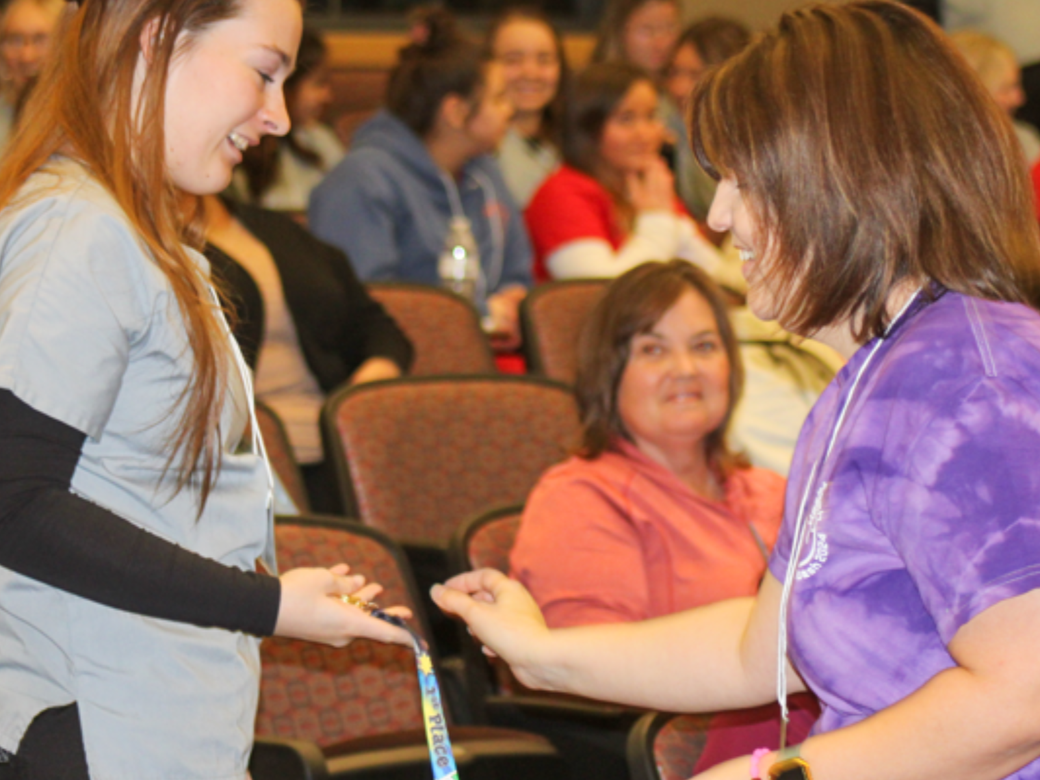This article was originally published in the winter 2024 issue of the Ivy Indy magazine.
“How many of you have been told art is not hard?” Stephanie Robertson asked her capstone class.
All 12 of her students raised their hands.
“And is it hard?"
A resounding “yes” rang through the T203 classroom in response.
It’s 6:30 p.m. on an October evening, and Robertson, the Ivy Tech Indianapolis fine arts program chair, just began working with her ARTS 250 Fine Arts Portfolio students in preparation for their upcoming showcase, “Realms of Duality.”
Graduating fine art students spend 10 to 12 weeks curating a collective exit exhibition every semester. Together, they execute every step with the mentorship of Robertson. They conceive of the title, develop an installation plan, manage the marketing, judge each other’s pieces, and price the work.
When visiting their class, Robertson was helping them with their art bios and tags.
“Always uppercase ‘Associate.’ An Associate of Fine Arts is just as important as a bachelor's degree. Give your Associate degree respect. You’ve earned the power it deserves,” she told her students as she wrote on the board.
The class said that coming up with Realms of Duality was not an easy feat, as there is a wide range of disciplines in the show – fabric, glass, ceramics, paintings, and drawings, just to name a few. Not to mention, each artist has a different subject matter and style.
“‘Realms’ kind of started as a joke. Because we all felt like we were in different realms,” Eden Hany said. “But then we realized we really liked it. It’s fantasy. It’s strange stuff. All of us are a part somehow. And ‘duality’ felt right because there are so many different ideas among us, but they somehow all can work together.”
The students did not create any new art for the exit show. The show is a culmination of their artwork over the past two years. At the start of the course, each student brought in 40 to 60 of their pieces, and their very first assignment was to judge each other’s work.
When asked if it was hard to be critiqued by their peers – who, mind you, are not of the same culture, heritage, walk of life, background, art style, you name it – they said, “Oh yeah. But that’s art.” “Period,” someone snickered. “Art is hard,” they rang out.
“It’s been intense.” Abby Stofferahn said.
Stofferahn is a visual communication major with a fine arts concentration. She graduated from Ivy Tech over a decade ago with her business associate degree but returned in 2022 in search of a career pivot. Stofferahn says so much goes into an Associate of Fine Arts degree that others who are quick to judge art majors have no idea.
“I've always done very well academically. But with this degree, I have to physically and academically apply myself. This is hands-on work. A lot more goes into the assignments for this particular degree, mentally and physically. I’ve been burned physically because of my art, and I’ve also burned out mentally, earning this degree,” she explained.
Everyone in the class echoed Stofferahn’s remarks in one way, shape, or form.
Da’Vion Stewart added that art is not only a mental and physical discipline. It’s also a matter of dedicated time.
“A lot of people that don't make art either professionally or at all have this mindset that you can whip up something in a couple of minutes or hours. In reality, much of what I do is a lot of research. I look into concepts and different aspects or styles of paintings just to figure out what I want to do for one painting, specifically. Painting a piece may only take a few hours, but it took a week of research beforehand,” Stewart said.
Hayes Lupin says that they feel like folks only see the end product. As someone with an invisible disability, they are all too familiar with people who do not take the time to think about the steps necessary to complete anything, especially from an accessibility standpoint.
“People just think, ‘Oh, you create stuff, and then you're done.’ And I feel like, as artists, we’re constantly explaining, ‘No. There are a million steps to make first,’” Lupin said. “There is more than just the doing. Being creative is an over-time skill. So, it takes time. And that time takes effort. And that effort takes energy. It’s a host of jumbled things that affect the other, and people often don’t understand that.”
“We always hear about how a creative job must be ‘fun.’ But it’s still a job. A job still takes work. You can still get burned out, just like anything else,” Hany said, perfectly encapsulating the forum of artist misconceptions.
The student exit art show was held in the Julia M. Carson Learning Resource Center Gallery. As usual, it was a night full of celebration, a send-off.
Some students struggled to explain their emotions as the day they’ve worked so hard for over the last four months – arguably the last two years or so – has come and graduation day nears.
“It’s difficult to explain how I’m feeling. I’ve been at Ivy Tech for over a couple of years because I decided to change my major,” Regan McKim said. “I’m moving on to earn my bachelor’s, and it's kind of overwhelming. It feels like a big step. But I know I’m ready.”
Realms of Duality felt just as the students hoped it would – like a variance of art styles and meanings that somehow complemented each other.
The showcase also reverberated with the complexities – dare we say, the duality – of art and the artist, just as the students explained in one of their final portfolio classes with Robertson leading up to the big day. Seeing each student’s artwork from the beginning of their studies to the end of their time at Ivy Tech Indianapolis, you’re almost forced to see the artist and their story.
“Art is not one thing,” Mauvene Borton said. “It’s the viewer's interpretation. It’s in the eye of the beholder.”
Roxanne Zbikowski agreed with her classmate but still hopes visitors of the Realms of Duality exhibit see that the “art is more than just a pretty picture on the wall … It’s something that is part of ourselves.”
Melanie Dawn nodded in approval of what Zbikowski said, adding, “I want people to see us. See our growth. Appreciate our evolution.”
About Ivy Tech Community College
Ivy Tech Community College is Indiana's largest public postsecondary institution and the nation's largest singly accredited statewide community college system, accredited by the Higher Learning Commission. Ivy Tech has campuses throughout Indiana and also serves thousands of students annually online. It serves as the state's engine of workforce development, offering associate degrees, long- and short-term certificate programs, industry certifications, and training that aligns with the needs of the community. The College provides a seamless transfer to other colleges and universities in Indiana, as well as out of state, for a more affordable route to a bachelor's degree.

